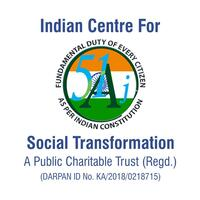
India success story of CSIR Technology absorption - efforts at grassroots - level developmental work
Terafil - A Low Cost Device for supply of Safe Drinking Water
1. Genesis:
Considering the need of a low cost filtration device for the country, CSIR-IMMT has developed the ‘ TERAFIL ‘ filter a highly efficient low cost device for supply of clean drinking water. The filter is especially useful when the water is rich in sediments, suspended particles, iron and certain micro-organisms causing water borne diseases. Turbidity up to 500 NTU and Iron up to 15 ppm can be easily treated with this Terafil filter. It is suitable for both surface water source like river & ground water sources like dug wells, ponds, tube wells.
The filter consists of a Terafil disc which is a porous sintered red clay disc and treats the raw water through filtration. It not only removes turbid particles, microorganisms, iron, color & bad odor from raw water, but also improves the taste. The rate of filtration can be increased many folds by applying pressure.The Terafil water filtration disc is produced by mixture of red clay (ordinary pottery clay), river sand & wood saw dust without using any chemicals. Equipments like a pulveriser (Atta Chaki), a low cost coal/wood fired kiln, few hand tools and cement platform are required for mass production of Terafil water filtration disc. With training of just few days itself, anyone can produce Terafil water filtration disc in any part of the country. Even the community Terafil water filters consisting of the ferro-cement chambers or masonry structures can be easily built by the local masons. The Terafil can be made in any shape; but circular disc shape is more preferred due to high strength, long operational life, and easy maintenance.



Nearly 99% of turbidity, 95-100% of micro-organisms, 90-95% of soluble iron, colour, bad odour etc. is effectively removed from the raw water by filtration through the Terafil disc. Pathogen free product water can be obtained from ground water by filtration through Terafil disc, while mild chlorination (0.01 gm/ liter water) is necessary for surface water. The filtrates/ sediments collected after filtration does not contaminate the water sources. Electricity is not required for operation of both domestic and community Terafil water purification systems.
The Terafil can be built in following capacities for different categories like domestic, community and online models:
- Domestic level filter : 20 & 30 litre with 1-4 LPH (litre per hour) rate of filtration.
- Community level filter : 1000 to 100000 LPD (litre per day)
- On-line pressure filter : 60 to 10,000 LPH
2. Diffusion:
- The filter is already in use by thousands of households in the state of Orissa, Karnataka, Meghalaya & few other states in various forms. TERAFIL water filtration discs are prepared under license and training from CSIR-IMMT.
- 1,000 LPD Terafil water filter are being installed in schools of various other states under central government schemes Bharat Nirman Yojana and Jalmani (a Ministry of Rural Development scheme for Installation of Stand Alone Drinking Water Purification Systems in Rural India).
- About One lakh sets of Terafil water filter have been installed in schools, Anganwadi centers, health centers of Orissa through CSIR-IMMT & Govt of Orissa. The picture show installation of a 50 LPH capacity TERAFIL water filter in Anganwadi centre in Keonjhar, tribal district of Orissa.
- Pachayataraj Engineering Dept (PRED), Govt of Karnataka have installed about 10,000 units of 5,000 LPD capacity TERAFIL water purification plants, specially for removal of iron, turbidity & micro-organism from ground water in 12 districts of Karnataka. These units would provide nearly 50 million liters of safe drinking water every day.

- The filters shown below had been successfully deployed in the flood affected areas in Bihar and other places

3. Economics:
- Average unit cost of a 100 mm diameter and 50 mm thickness Terafil disc fitted with food grade plastic holder costs about Rs 25. This disc can purify 1 LPH (litre per hour) in a domestic filter for about five years.
- Terafil disc can also be fitted with any domestic container to make a water filter, the cost of cleaning water is below Rs 2 per ton considering total cost of Terafil filter/plant (excluding cost of raw water), therefore poorest of poor can afford the Terafil water filter.
- An entrepreneur with four skilled workers can produce complete 500 sets of 100 mm dia Terafil water filtration disc per day, or 12,000 sets with an expenditure of Rs 2 lakh towards materials, labour & power in a month.
- An investment of about Rs 3 lakh (excluding cost of land & building) is required for production of various kinds of Terafil filter units (50-30000 liter per day). Total investment can be recovered back within six months period.
- For community level water filters a space ranging from 1 to 300 m2 would be required for a plant of 1000 to 100000 LPD capacity respectively.
- Technology fee for licensing manufacture of Terafil filter:
- Rs 15000 onetime payment for DIC registered micro and small entrepreneurs
- Rs 60000 onetime payment for other entrepreneurs (10.3% service tax extra).
- Tentative Cost of different kind of Terafil water filters:
- Domestic (30 liter through CIPET) : About Rs 450 including VAT & Packing
- Domestic (22 liter through CSIR-IMMT) : About Rs 385 including VAT & Packing
- On-line Terafil water filter Unit price of a complete (without water tap & pipe) : Rs 1000 VAT
- Community Level construction cost of 1000 lit capacity/day Stand-alone Terafil water purification plant (without water pipeline) : Rs 10,000.
4. Technical Details about Terafil
The dough of the mixture is sintered at high temperature in a low cost coal / wood fired furnace to make the terracotta disc porous. During sintering process, the wood particles are burnt and clay particles are sintered around the sand particles leaving elliptical / circular large size pores in between. These pores are not connected with each other, unlike white ceramic filter candles, but sepa- rated by very thin clay walls which are semi-permeable in nature. The thin clay walls contain large numbers of ultra-fine capillary openings. A set of pores are connected by these ultra-fine capillaries only. Average diameter of the capillary openings is in sub-micron size. During filtration process, water flows from one pore to another pore through the capillary openings by pressure of raw water over the Terafil disc. The pores inside the Terafil disc always work like micro-reservoirs of filtered water. Since opening of the capillaries are in sub-micron, almost all suspended particles & microbes etc. cannot enter into the capillaries; hence sediments & impurities are deposited on top of the Terafil disc during filtration. Therefore the core of Terafil disc is never clogged unlike white ceramic candle during filtration.
Rate of filtration is dependent upon turbidity and pressure of raw water as well as diameter of Terafil disc inside the filter. The filtrates clog the top surface of the Terafil over time during use and hence reduce the flow rate. Therefore scrubbing or cleaning the top surface of the Terafil disc with a soft nylon brush or coir or similar abrasive materials or by water jet is necessary to remove the sediments and open the new pores for rejuvenation of filtration process. The thickness of the Terafil keeps reducing on scrubbing its top surface; however quality of filtered water is not altered during entire life of Terafil.

5. Ongoing Futuristic R&D
Under CSIR 800 program (RWSNET project RSP-29), CSIR-IMMT has outsourced R&D to ARCI-Hyderabad, Government of India to impregnate Nano silver in Terafil disc to get filter water 100% free from bacteria & virus. Results are highly encouraging. The commercial Nano-silver technology package for Terafil is expected shortly.






